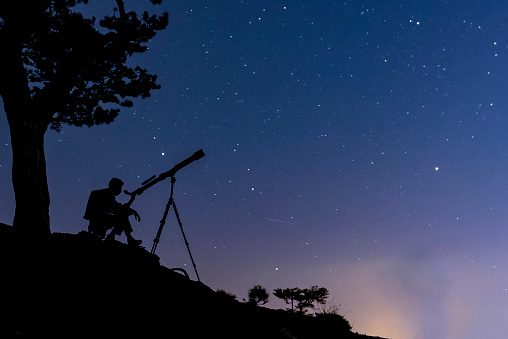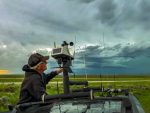
| Meteorite Hunter Key Stats | |
|---|---|
| Education | 0-6 Months |
| Job Outlook | 0% |
A meteorite hunter scours the globe to discover the remnants of meteorites that have fallen from the sky.
If you’re interested in space and science, and like to be outdoors, then you might like to become a meteorite hunter.
Some meteorite hunters are actually scientists, such as geologists or atmospheric scientists who look for fallen meteorites as a part of larger research projects, however there are also many hobbyists who travel the world looking for newly fallen meteorites.
Table of Contents
Education Requirements to Become a Meteorite Hunter
The education you need to become a meteorite hunter will depend on whether you are looking for a career or a hobby.
If you would like to become a hobbyist, you simply need to develop the skills to find a meteorite.
You can do this on your own by reading books and even surfing the internet.
You might also be able to talk to an actual meteorite hunter and have them teach you the required skills.
Scientists such as geologists, meteorologists, and atmospheric scientists may search for meteorites as a part of their own research projects.
If you are looking at this kind of work you will need a college education.
You would need to complete a bachelors degree with a major in the field of interest, such as geology.
To work in research, you would need some postgraduate education also.
This could consist of a masters degree program, which would allow you to work as a research assistant.
If you wanted to head your own projects then you would need to complete a doctorate.
Many researchers are employed as college professors.
Meteorite Hunter Job Description
Finding a newly fallen meteorite might seem like it’s a simple task.
A flaming hunk of rock falling through the sky has got to be easy to locate, right? Wrong.
Meteorite hunting is actually very difficult.
Generally, if a meteorite is not discovered within a few months, it will be disguised by soil and plant life and almost impossible to discover.
One of the most common ways to discover a meteorite is with the use of a metal detector.
This will detect the large deposits of iron and other metals that exist in most meteorites.
Ground penetrating radar and even land mine detectors are needed to find meteors that do not have enough iron or nickel in them to be found with a standard metal detector.
When you become a meteorite hunter, you might relocate to an arctic or desert region.
As there is less vegetation and soil movement, it is far easier to detect meteorites in these locations.
Meteorite Hunter Salary and Career Path
If you become a meteorite hunter that does this as a hobby, it’s likely that you will do some other work during the year to make an income, but you can make some money on the side meteorite hunting by selling your findings to collectors and scientists.
You could also take photos and video of the meteorites you find to sell to news and media agencies.
Some meteorites weigh just a few hundred grams, while others can weigh in at hundreds of kilograms.
Their value too is variable.
Some may sell for as much as one million dollars.
A meteorite which falls on a manmade object such as a building or a car is called a hammer stone.
These are worth more money than other meteorites.
Recently, a meteorite that was discovered was sold for over a million dollars.
With this figure in mind it’s easy to see why many people are attracted to meteorite hunting.
In reality, it can take years of hard work to make a major discovery.
Working as a scientist, you’ll receive a far more stable income.
For instance, the median wage of a geologist is $75,000 a year.
It will take far longer to start your research work.
You will need to start as a research assistant, then go on to teaching positions and work towards tenure.
Some similar jobs to meteorite hunter include:
- Atmospheric scientist
- Storm chaser
- Geologist
- College professor
- Meteorologist
If your passionate about space, discovering fallen meteorites, and science, then you might like to become a meteorite hunter.
While you may face many long days coming up with nothing, making a discovery can be very rewarding.
![]() The below information is based on the 2023 BLS national averages.
The below information is based on the 2023 BLS national averages.
National Average Salary
$101,530Average Salary by State
| State | Avg. Annual Salary |
|---|---|
| Alabama | $84,740 |
| Alaska | $98,710 |
| Arizona | $88,740 |
| Arkansas | $98,250 |
| California | $118,580 |
| Colorado | $108,640 |
| Delaware | - NA - |
| District of Columbia | $131,640 |
| Florida | $90,510 |
| Georgia | $87,600 |
| Hawaii | $112,340 |
| Idaho | $103,770 |
| Illinois | $75,810 |
| Indiana | $113,070 |
| Iowa | $91,500 |
| Kansas | $70,210 |
| Kentucky | $77,780 |
| Louisiana | $95,110 |
| Maine | $100,710 |
| Maryland | $116,340 |
| Michigan | $98,740 |
| Minnesota | - NA - |
| Mississippi | $74,530 |
| Missouri | $111,890 |
| Montana | $94,700 |
| Nebraska | $99,360 |
| Nevada | $97,880 |
| New Hampshire | $62,860 |
| New Jersey | $118,930 |
| New Mexico | $99,820 |
| New York | - NA - |
| North Carolina | $101,450 |
| North Dakota | $89,470 |
| Ohio | $92,950 |
| Oklahoma | $89,960 |
| Oregon | $119,510 |
| Pennsylvania | $87,840 |
| South Carolina | $98,900 |
| South Dakota | $85,280 |
| Tennessee | $93,860 |
| Texas | $85,420 |
| Utah | - NA - |
| Virginia | $116,330 |
| Washington | - NA - |
| West Virginia | $68,670 |
| Wisconsin | $98,770 |
| Wyoming | $100,640 |
The top earning state in the field is District of Columbia, where the average salary is $131,640.
These are the top 5 highest-paying states in the field:
* Employment conditions in your area may vary.
Frequently Asked Questions
What does a meteorite hunter do?
A meteorite hunter is a person who is engaged in the search for meteorites.
It can be an amateur who chooses to go on a ‘hunt’ after his or her main job and during the weekend or a professional who makes a living on meteorite hunting.
The most typical tools that meteorite hunters use are metal detectors and magnets.
The truth is that meteorites can be found anywhere – underwater, in the city, in the desert, or even in your backyard.
There might be only a few hundred semiprofessional and professional meteorite hunters out there that travel the world in search of the meteorites.
People may use a magnet that will pick up the meteorite from the ground or a metal detector that will help detect the ‘gem’ through the soil.
How much do meteorite hunters make?
It is difficult to estimate how much meteorite hunters actually make.
The income would certainly depend on the quantity of the meteorites that the hunter managed to find and on the quality of the finding, of course.
Usually, you can expect to make anywhere between $5.000 and $25.000 per rock; however, there certainly are plenty of exceptions.
Meteorites can be incredibly valuable to collectors and scientists that study planetary science.
How much does it cost to become a meteorite hunter?
In case you decide to become a meteorite hunter, you would surely need a metal detector.
There is a wide range of models available online nowadays; you can easily find the one that will suit your budget (around $100).
Once you find a rock that you think looks like a meteorite, you would have to send the thing for meteorite testing.
The price of the meteorite will be a lot higher if it has been tested and classified.
In case you need the results within 3 days, the test of the sample will cost you $35; if you are ready to wait for around two weeks – $25.
Once the meteorite has been verified, you would have to submit it to the Meteoritical Society for classification and registration.
It will cost you between $40 and $1600 to become a member of the society, in case you decide to do so.
What is the demand for meteorite hunters?
Our planet is under constant bombardment of space rocks.
Meteorites can fall uniformly across the globe.
The worst part is that meteorites rarely remain on the surface; if no one had discovered the precious thing within 2 months, it will be covered in plant growth and be buried with alluvium.
That’s exactly why a lot of people prefer to go meteorite hunting in arctic and desert regions, as those are great surfaces for hunting visually.
How long does it take to become a meteorite hunter?
Before becoming a meteorite hunter, you have to make sure that you have permission to search for meteorites on the spot that you have picked.
Space rocks that have been found on federal land belong to the government, so go hunting on private property (but make the necessary arrangements with the landowner beforehand).
You might be lucky and find a meteorite within a few hours; however, a lot of people spend years on finding the real ‘gem’.
Meteorite testing will take 14 days maximum.













